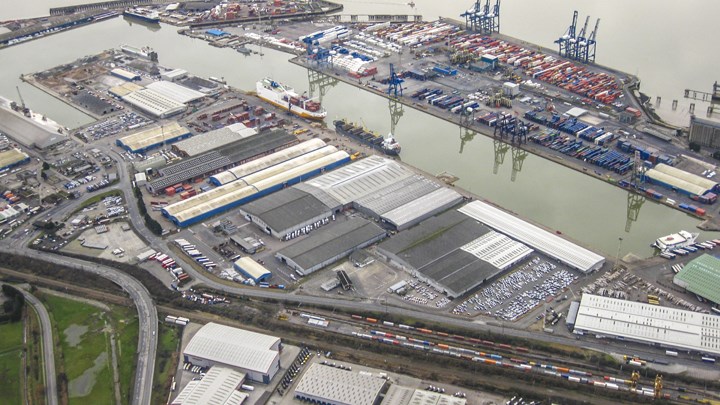RWE, Mitsui, and Port of Tilbury sign MoU on green hydrogen …

William Barton / Shutterstock.com
An aerial view of the Port of Tilbury. Its operators, Forth Ports along with RWE and Mitsui, will develop two green hydrogen projects to help decarbonise operations.
RWE, one of the UK’s largest power generators, along with global trading and investment company Mitsui, and the Port of Tilbury have signed a memorandum of understanding (MoU) to develop two green hydrogen projects that will help decarbonise operations at the port in Essex.
The Port of Tilbury is the largest of eight ports owned by Forth Ports, and the largest multi-modal port in the South East. It has an annual throughput of 16m t/y from varied cargoes, and is spread across an estate in excess of 405 ha.
In an effort to decarbonise its operations, the Port of Tilbury will work with RWE and Mitsui on a small scale 10 MW proof-of-concept demonstrator project to produce green hydrogen that will supply its infrastructure as well as surrounding industry.
The project will be developed at a site that previously housed a coal-fired power station, and the partners will also look at options to scale up the development to 100 MW over a ten-year period.
Peter Ward, commercial director at the Port of Tilbury, said: “This is an important opportunity to support the Port of Tilbury’s commitment to achieving Net Zero for our customers. Our business has set out our ambition to be carbon neutral by 2032 and Net Zero by 2042 by investing in the infrastructure in the ports. As part of Thames Freeport, our MoU with RWE and Mitsui to develop a new hydrogen plant at the Port of Tilbury will help accelerate the UK’s path to a decarbonised economy and support our vision for low carbon logistics.”
Ward is also leading work for Thames Freeport, a new venture which received final government sign off in March. [1]
Set up by Ford, Forth Ports and DP World, the freeport is set to receive £25m (US$32m) in government funding, and is expected to generate over £4.6bn in new public and private investment, while creating over 21,000 new jobs and many more across supply chains, ministers said.
Good, but not a total solution
Hydrogen is seen as a promising component in helping the UK achieve its 2050 net zero ambitions, but it is not a panacea that will fix everything, the UK government has said.
According to a House of Commons science and technology committee report, although hydrogen gas does not produce CO2 when burned, using hydrogen to replace fossil fuels within our energy system “would entail significant investment in the networks and infrastructure needed to distribute it around the country.” As such ministers disagree with the Climate Change Committee’s recommendation that the government should mandate new domestic boilers to be hydrogen-ready from 2025. [2]
Furthermore, currently in the UK, hydrogen is most commonly produced from fossil-fuel intensive processes without capturing greenhouse gases – so called “grey hydrogen”.
Switching to greener forms of hydrogen, like blue hydrogen that is made with use of CO2 capture and store, or green hydrogen which uses renewable power to split water, would therefore require significant advances in the economic deployment of CCUS and/or the development of a renewable-to-hydrogen capacity, the science and technology committee report notes.
As the timing of these is uncertain, “it would be unwise to assume that hydrogen can make a very large contribution to reducing UK greenhouse gas emissions in the short- to medium-term,” ministers say.
Instead, the government suggests that hydrogen will be best suited to applications or places which are hard to electrify, such as some parts of the rail network, or energy intensive industries like steel, glass, and mineral production. It could also benefit uses that do not require the creation of an extensive refuelling network, such as local bus services operating out of a fixed number of depots, and users who are adjacent to, or have access to, places where hydrogen is produced, like industrial clusters.
References
- ^ government sign off (www.gov.uk)
- ^ report (committees.parliament.uk)